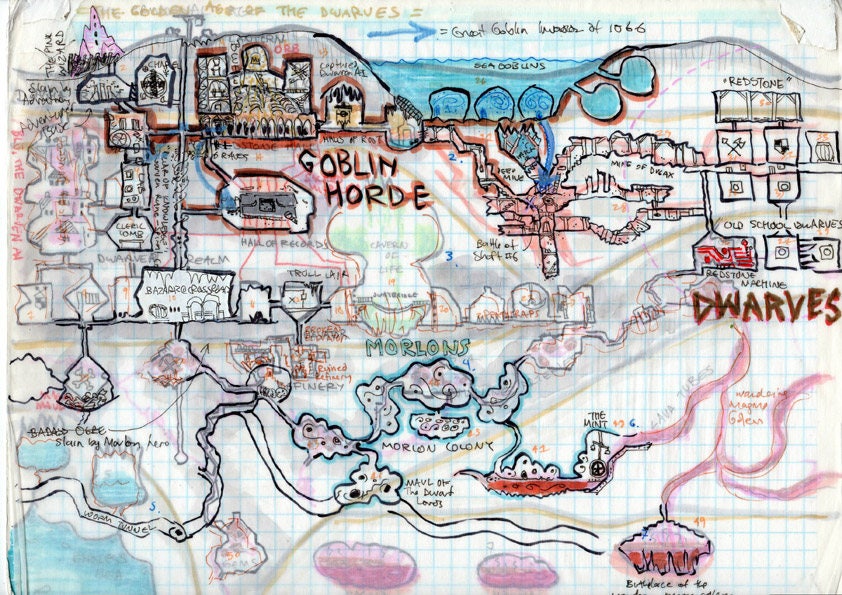 |
| How to Host a Dungeon session drawing by Tony Dowler |
I recently asked the following question on multiple social media platforms.
Do you care about logic in your dungeons?
The overwhelming answer was, "Yes," though a number of responders indicated that they wish they could stop caring and be more like their younger selves, who apparently didn't care. For most, the preference boiled down to some form of desire for verisimilitude; dungeons that feel "real." Individuals who want logical dungeons say that spaces should feel like they have purpose and make sense on some level ... or in the case of dungeons, all the levels. ;) Things living in a dungeon need places to execute basic functions: sleeping, eating, and eliminating waste, at the very least.
A few respondents pointed out that the logic of a space helps player characters predict what's ahead. This seems like an important point to me. It helps players feel competent and feel like their characters are competent. If the dungeon is so chaotic it can't be figured out, at least in part, players will stop trying to use their heads.
Despite agreeing with some of this, and having a sympathy/understanding for all of it, I want to present a few arguments against space-logic that is too transparent – or even transparent at all. I'm using the word "space" because the word "dungeon" is, after all, kind of a universal stand-in for the place in which characters adventure in an adventuring RPG. It could be a literal dungeon, or a city, or a huge desert, a chain of islands, or mountain range. But most of what I have to say applies to spaces created or altered by intelligent species.
Time and Worldview
In many cases the spaces in question are occupied by creatures that are not the builders. There may have even been multiple inhabitants in the space since the builders. With each new wave of occupancy, there is no guarantee that usage of the space is consistent. Humans aren't even consistent in the usage of houses they purchase from other humans, turning bedrooms into home offices, dropping walls to "open things up," and converting attics and porches into bonus rooms. Imagine how much more likely discontinuity is when the hand-off involves a different culture and/or species with different physical needs. Evolving technologies play a role too. Did houses built in the 1700s have toilets? The further back one reaches the harder it is to accurately assess the purpose of a space. Modern archaeologists struggle to understand, with any certainty, how neolithic sites like Gobekli Tepe or Stonehenge were actually used. And even the best theories are hard to prove conclusively, thus some mystery remains.
What is "logical" or "intuitive" for one species and culture is often radically different from what is logical and intuitive for another. Why would goblins need or want ceilings taller than 5 or 6'? Kuo-toa might use pools fed by hot-springs for spawning where Dwarves use them for quenching metal and Elves for baths. A religious culture might set aside a large space to honor their god while a hive culture would need a large space in which to huddle for safety or sleep, or perhaps a throne-room for their hive queen. A dragon would assuredly use the largest space for its' all-important hoard. If there is logic to be discovered, characters would need to figure out things on multiple levels - why the builders created things the way they did and how the current inhabitants might use the space.
Illogical by Nature
Some spaces strive to be non-intuitive. A mad wizard's deathtrap dungeon, a modern "funhouse," a massive tomb made to befuddle grave robbers! Generally, if player characters know the motive behind such a space, the players will be more at peace with the lack of logic.
Often, the most satisfying (and "realistic") compositions mix the new with the known. Humans crave some variation and a bit of mystery. A subject of study that is utterly predictable becomes tedious and boring. Conversely, humans crave the familiar. A subject of study that "makes no sense" can be unsettling or boring in a different way – as the examiner gives up trying to figure it out at all. Therefore most spaces should contain some mix of the familiar/predictable and the unfamiliar/bizarre. There is a time and a place for spaces that skew hard toward one of the poles, but oddly enough the result of such extreme spaces – whether it is the unknowable interior of an alien spaceship or the utterly known interior of a small town tavern – the result is the same; they quickly fade into the background. This is why every store in a major chain is set up in a similar way.
Conclusion
If you want your spaces to engage players, give them a few "logical" handles, and make them work for the rest. And to be fair, you don't have to fully understand the space as the GM either. The players will come up with the answers (or not); just use the ones that seem the coolest.
No comments:
Post a Comment
Comments are moderated; please be patient.